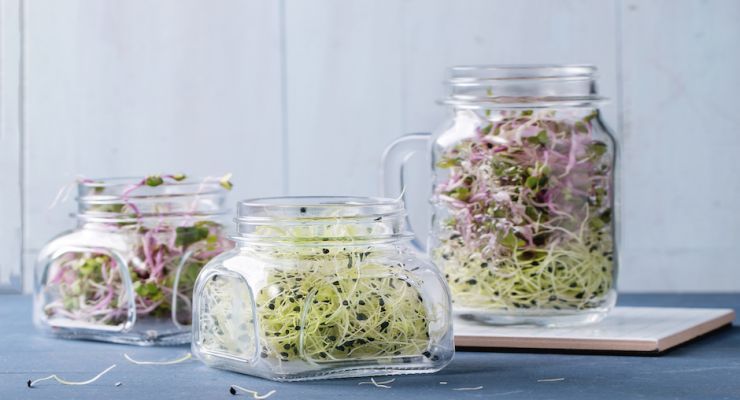The concept of sprouting seems to be a topic of rising popularity amid the natural community as people begin to discover the health benefits of these tiny sprouted seeds. However, the idea of growing sprouts can be a little confusing at first, and it may seem easier to just purchase a package of fresh sprouts at your local grocery store. On the contrary, growing your own sprouts at home is an incredibly time-friendly and straightforward process. Plus, you’ll be able to eat your greens in a matter of days and you’ll know exactly where your food is coming from. Here are three reasons you should grow your own indoor sprout garden today and a few tips and tricks to get you started.
What exactly are sprouts?
Sprouts are seeds, nuts, or beans that have been germinated and left to develop a sprout. These crunchy greens can be added to salads, sandwiches, stir-fry, or even eaten raw as a snack.
Why should you sprout?
Packed full of beneficial enzymes
Sprouts are jam-packed with hundreds of beneficial enzymes that improve your digestive health and assist your body in better processing the extensive nutrients of beans, nuts, and seeds.
Makes nutrients more readily available
When you cook these foods instead of sprouting them, you are missing out on the chance for even more vitamins. Because of a particular chemical reaction that occurs when the seeds germinate, vitamins such as vitamin c, iron, and zinc are more prevalent and accessible.
Protective compounds
Because you are ingesting the entirety of the plant in a concentrated dose, you are also getting all the benefits of that plant as well. Sprouts can provide compounds that help protect the body from dangerous free radicals and other toxins.
What to sprout?
Once you’ve decided to take up sprouting, figuring out what you want to grow can be confusing. This list is a helpful guide to help ensure sprouting success.:
Broccoli sprouts
Broccoli sprouts are a common choice for windowsill sprouting because they possess a dietary component known sulforaphane that has been shown to possess cancer-fighting properties.
Alfalfa sprouts
If you find yourself eating sprouts frequently, you may want to consider sprouting alfalfa greens as they are ready to harvest very quickly. Plus, they are an excellent source of vitamins B, K, and C and may have immune boosting abilities.
Beans and nuts
Most types of beans and nuts, excluding pecans, walnuts, and red kidney beans are safe to sprout and will quickly grow in your indoor sprouting center.
How to sprout?
- Wash and sterilize all equipment and hands in hot water.
- Simply pour about ½ cup small seeds, or ¼ cup larger seeds into the bottom of a quart sized glass mason jar.
- Cover seeds with one cup of purified water.
- Seal with a piece of cheesecloth and a rubber band or a special sprouting lid.
- Soak for 12 hours.
- Strain off water and return to jar.
- Rinse sprouts thoroughly and drain again.
- Place at an upside-down angle to allow excess water to strain off. It is helpful to use a bowl to keep the jar at this angle.
- Rinse at least twice a day (or more) with filtered water. Be sure always to keep the jar tilted at an angle in between rinses so that sprouts are not sitting in water.
- Each type of sprout is different, but more are ready to harvest in 3-7 days.
- Rinse extremely well in cold, filtered water after sprouting.
- Store in fridge for up to one week.
Note of caution:
Though they are incredible for your health and wellness and are an easy way to ingest supportive nutrients and vitamins, sprouts are occasionally thrown into a negative light regarding issues with food safety. Because they are germinated in a moist environment, they can develop dangerous bacteria such as Salmonella or E. coli. But before you run to throw out all your sprouts, remember that these incidents are primarily due to poor handling of the seeds and improper food safety. Here are a few ways to ensure that you seep yourself and your family safe from foodborne illness:
- Be sure to thoroughly sterilize every jar or container with extremely hot water before using it for sprouts.
- Wash hands well before planting or harvesting sprouts.
- Soaking sprouts in a mixture of 1 part lemon juice to 6 parts water for 15 minutes before enjoying may help kill any lingering bacteria.
- Follow rigorous rinsing schedule and growing directions.
-Susan Patterson

